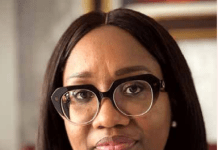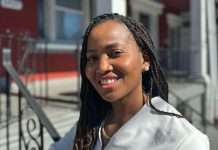Pharm. Emmanuel E-Doggy Ezirim is the founder and CEO of Central Point Pharmacy, a USA-based community pharmacy, providing clinical and vaccine/immunisation care to the local community in Columbus Ohio. He is very versatile and dynamic, with interest and accomplishments cutting across multiple areas, which are multidisciplinary in scope. In addition to his accomplished career in Pharmacy, which includes roles as pharmacist-in-charge, director of pharmacy, and independent pharmacy owner, E-Doggy is also an accomplished athlete, author, actor, bodybuilder and philanthropist. Some of his innovative accomplishments are self-evident within notable institutions like The Ohio State University (OSU) and the Nigerian Association of Pharmacists and Pharmaceutical Scientists in the Americas (NAPPSA). In this interesting interview with TEMITOPE OBAYENDO, he bares his mind on how the NAPPSA’s Business-2-Business network system will benefit Nigerian pharmacists and other healthcare professionals, thereby transforming the Nigerian healthcare landscape. Excerpts below:

Kindly tell us the rationale behind your title of E-Doggy.
Ha-ha. Yes, indeed “E-Doggy” is a title – not just a title, but an office of its own. E-Doggy is simply my nickname, derived from the fact that in high school I was part of some very good 4×400 / 4×100 relay teams (called Buffalo Boyz). They were my dogs. At the Ohio State University, I had a teammate named Manuel. One of us was going retain the nickname “Manny” and it was not going to be me. I thought the name was Mexican and my accent was too different, so “E-Dog” quickly took shape – then on to E-Doggy Dog. I am the Igbo shepherd.
You are a founding member of NAPPSA. Could you share with us some of the factors that propelled the establishment of the group?
The first thought for me as a co-founder of NAPPSA was empowerment for my people! Working for one of the major chain pharmacies at the time, I could log in to the system and see all the pharmacists and store managers that were logged in too. I was struck by the number of Nigerian names I saw each time. By my estimation, over 70 per cent of that group was “9ja” people. Wow! That was powerful.
I have always understood the power in numbers. There is electoral power in numbers, when a group organises as a voting bloc. There is economic power in numbers, when groups operate as one economic unit. It struck me that Nigerians in America had the numbers. All that was missing was organising and channelling that power in a cohesive manner.
Thankfully, Pharm. Nnodum Iheme, NAPPSA foundation president, had the means to bring some great people together and we worked together to translate that vision into NAPPSA. In the formation process, the idea to expand the organisation to include pharmaceutical scientists was well received as it allowed for a representation of the full spectrum of the pharmaceutical value chain.
The proof is obvious. It allowed for a larger tent and a greater pool of great minds like our current President, Dr Anthony Ikeme, whose transformational leadership is driving the current exponential growth we are experiencing in NAPPSA today.
The NAPPSA B-2-B concept was your brainchild. How has this networking system benefited NAPPSA members, and can it be of help to the Pharmaceutical Society of Nigeria (PSN)?
The NAPPSA B-2-B System is based on one of, if not the most efficient systems, in nature, The Geese Formation. It is a community empowerment system based on co-dependence and inter-dependence. It is based on a mindset that recognises that collective success is far superior and more powerful than individual success.
I refer your readers to an article I co-authored with the NAPPSA President, Dr Anthony Ikeme, published in the official NAPPSA news magazine, NAPPSA Digest, Volume 1, Number 1, titled “The NAPPSA Business-to-Business Network: Creating an Ecosystem for Community Empowerment.” It is available at NAPPSA website www.nappsa.org and it spells out in detail the workings of the NAPPSA B-2-B and how it has served as the engine for financial success of both the individual business participants and the NAPPSA organisation within which it is set up.
Coming back to your question, could it help PSN and its members? The answer is “Absolutely yes!” Not only can it help, but I also go a step further to submit that it is their best option for success going into the future. At some point in our relationship with PSN, we hope to have a forum to share our thoughts on how the B-2-B system can be applied within the Nigerian context to nurture and sustain the growth of the Nigerian pharmacy profession and the entire Nigerian healthcare sector. The results we have accomplished at NAPPSA is a proof that what we’re doing is no longer theoretical – it is a proven model for success.
There have been complaints from some community pharmacists in Nigeria that patent medicine dealers are taking over the business from them. As a successful Nigerian independent pharmacy owner in the USA, how would you advise your Nigerian colleagues in the face of this prevailing circumstance?
Perception is reality. If patent medicine dealers are a threat to community pharmacies, then the community pharmacists must ask themselves, why? Every battle is winnable, but you must be organised and should never fight alone. Nigerian community pharmacists need to come together and work collaboratively to address this challenge. We will be very happy to have a B-2-B session with our Nigerian colleagues and share how our B-2-B framework is applied to shoulder common burdens and overcome shared obstacles. Please be sure to let them know I have made this offer.
Funding is also another challenge preventing the expansion of some retail pharmacies owners in Nigeria. In what ways do you think they can generate funds to enhance business expansion?
Yes, funding is a challenge everywhere, even here in the USA. My Bible says advises against being a borrower (Proverbs 22:7). People must learn to take inventory of their values before going into a business relationship and it always starts with the numbers; but often, people tend to dwell on their weaknesses and obstacles, rather than their strengths and opportunities. This will be a major subject and workshop area of the B-2-B when we get the opportunity to interact with the Nigerian community pharmacists.
The Nigerian government is yet to grant vaccination approval to pharmacists. What do you have to say to this?
Interestingly, your previous question was on the challenge of funding and this one relates to the value(s) one brings to the table. The failure to grant to pharmacists, vaccine provider status in Nigeria undermines the nation’s capacity for achieving optimal healthcare access. One of the main goals set by the World Health Organisation (WHO) for the future of public health is the formation of accessible, multidisciplinary networks of public health professionals who actively engage within communities and provide key public health services in order to improve the life expectancy of the population.
Pharmacists are the most easily accessible healthcare professionals in the community and therefore form an indispensable component of the WHO agenda. Community pharmacies have great potential as a setting in public health owing to their location in the heart of the community. This characteristic feature provides a platform for more proactive contribution in solving gaps in public health services and programmes, including health-promotion and a variety of preventive services.
This value of the pharmacists must be understood by the healthcare policy makers in Nigeria. The question is, has this case been properly articulated to the right people in the corridors of power? As I said earlier, my people must learn to take inventory of their values before going into these negotiated relationships. The government is absolutely hurting the general community by not allowing the pharmacists to participate. The pharmacists are hurting the society by not properly articulating their value to the government.
On a scale of 1-5, how would you rate Nigerian pharmacists in terms of clinical practice? Going forward, what are the grey areas to be addressed in the practice in Nigeria?
On a scale of 1-5, I would rank my Nigerian counterparts at 2.5. That said, USA is only 3.5 in my approach. I would never rank any system as a 5 because the world is always changing, and we keep adapting. Just on their resolve alone, Nigeria is hanging tough. I can’t wait to see what happens when we implement a functional system of electronic data management.
We also have huge opportunities in setting up a more collaborative healthcare delivery system in which the physicians, pharmacists and the nurses see themselves as one interdependent unit, rather than the superiority fights that have become common amongst healthcare professionals. I am ever hopeful that the best still lies in our future.
What is your advice to the leadership of PSN on the growth of the Society vis-à-vis global pharmacy practice?
My best advice to the PSN leadership and all our healthcare partners in Nigeria is to embrace the opportunity for a global reach that the new visionary NAPPSA leadership provides. The world has since become a global village and every institution must think global, even as they act local.
A good look at the NAPPSA 10-Year Strategy Plan, as presented by our prudential president, Dr Anthony Ikeme, shows multiple opportunities for PSN to leverage NAPPSA’s platform for engaging Nigerian diaspora pharmacists and plugging into the global pharmaceutical continuum. Working with NAPPSA, there is so much that can be achieved to the benefit of both organisations and the Nigerian pharmaceutical sector. I invite them all to come fly with us, The Geese Formation!











